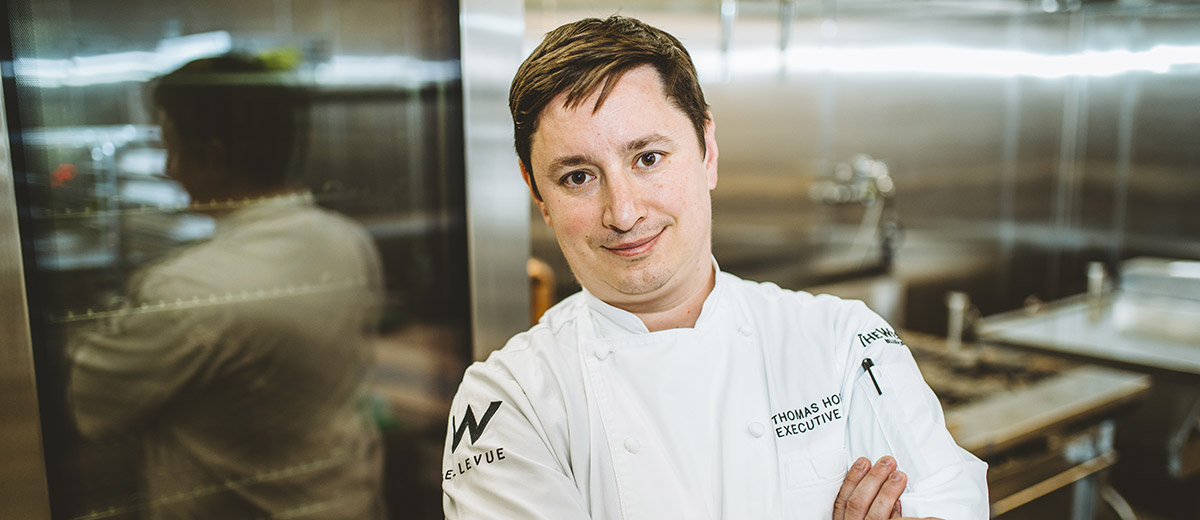A graduate of the International Culinary Academy in Pittsburgh, Executive Chef Thomas Horner began his career with Marriott in New Orleans, and has since climbed the corporate culinary ladder with stops in Florida and Seattle, in addition to the California desert. Along the way, he’s collected the Golden Scepter Award from the Southern California Restaurant Writers Association, and twice been guest chef at the James Beard House in New York. Horner returned for a second stint at the Marriott in Palm Desert in 2014, where his passion for cultivating sustainable, local fare continues.
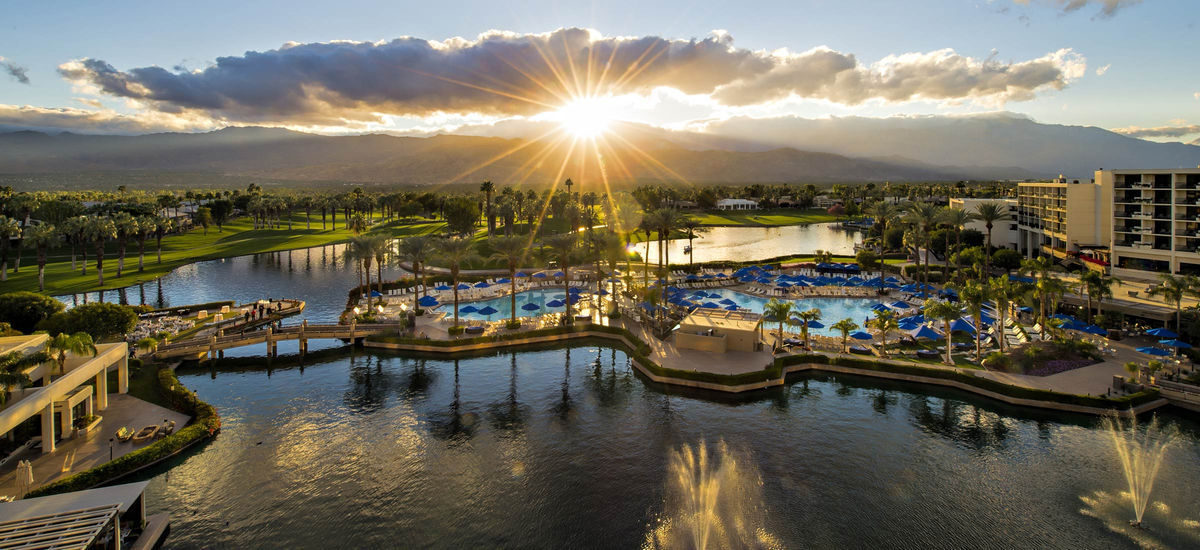
As Executive Chef at the JW Marriott Desert Springs Resort & Spa you’re responsible for overseeing the direction and guidance for the entire culinary team. How would you describe your leadership philosophy?
We have 172 people in the culinary department, which is one of the biggest I’ve ever overseen. My team is a big part of the sales process in terms of bringing large groups into the hotel for catering events, events with a lot of action stations and banquets. We do half a million dollars a month in pay roll so it’s definitely a little bit of an army. My leadership philosophy is to find out where my talent is and position them in a role that best plays to their strengths. Not everyone can be good at everything, but if you figure out ways to highlight a person’s skills and put him or her in a position where they can excel, it’s a win-win situation.
What does a typical day look like for you at the resort?
We have seven restaurants and eleven kitchens on site, including a lobby bar, a sushi bar, the spa bistro and golf course, which is more self-service cafe. No day is the same. In fact if it ever were like Groundhog Day I’d do something different! I can come in and have a day fairly well planned out with meetings but get side tracked real easy. We’re a convention resort, so the hotel was intended for large groups to enjoy the luxury of being in a desert resort setting to conduct their business. We can quickly shift from a business to leisure with a plated dinner for 1,700 in the ballroom one day, and 5,000 people at the pool the next, so it keeps me, and my team on my toes. I have a lot of chefs here, one executive sous chef and five senior sous chef managers. While I might help write the music they certainly know how to conduct it.
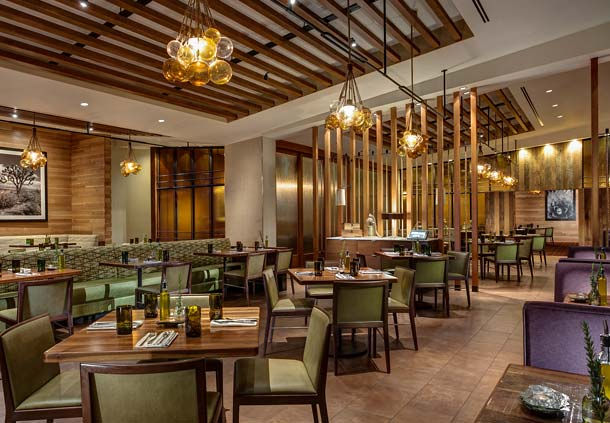
What are some of the biggest challenges in the career of a resort/hotel chef?
I think it’s being good at a lot of different things. You have to have a restaurant background – understand all three meal periods and what they look like. Pastry arts are important too, again that’s all three meal periods and what those expectations are. You also have to understand banquets and the hospitably aspect, in addition to the waste aspect. Running the hotel is like running a city: it’s 365 days year, we don’t have off days. You also need to be financially astute to understand the budget. We spend $750,000 a month on food and $100,000 on ‘controllables’ (china, glassware, silver cleaning supplies etc.). By watching what’s coming out of the garden, which produce is readily available for instance, you can save money there too but you have to find the right partners. That’s one of the reasons why we’re so excited to serve Aussie meats here because their ranchers are such good stewards of the planet. I’m also fortunate to have a really good team. One of the things I’ve enjoyed most about my own Marriott career is helping people achieve that next step in their career. We’re soon to be the largest hotel company in the world – alongside Starwood and Westin – so we’re a big band of brothers in the culinary department. There’s been a lot of great career development watching the growth in this team.
Since returning for a second stint at the Marriott in Palm Desert you’ve developed an interest in cultivating sustainable, local fare, as both a farmer and a food purveyor. Can you tell us a bit about that?
The first four years of my career I ran an Italian restaurant in Orlando called Ristorante Tuscany, where my team and I won the Golden Scepter. It was considered one of the best in town and an extremely fun job, probably one of the best I’ve ever had. Then I joined the JW Marriott Orlando, where Melissa Kelly (two time James Beard Award Winner) opened her second restaurant, Primo, with Kathleen Blake. Those ladies really inspired me in terms of what sustainable, responsible food was really all about – Kathleen used to yell at me because I threw away parsley stems! Because of Melissa and the gardens that momentum grew into Whisper Creek Farm: The Kitchen, and inspired my move to the Pacific North West. When a position opened up at the Seattle Marriott Waterfront it was a no brainer for my family and I to head up there.
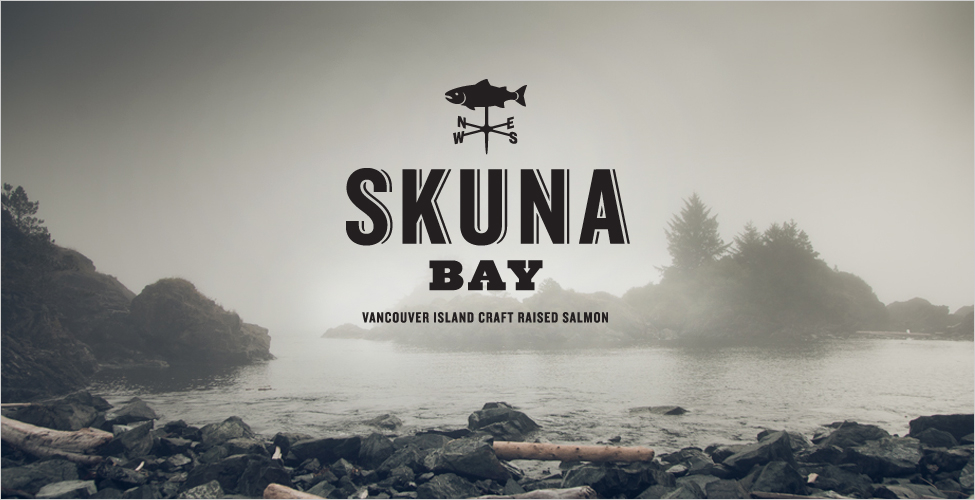
In Seattle I was inspired by Pike Place and its products; the city’s flavor and food profiles are just amazing I mean there are some seriously talented chefs up there. I continued to grow and meet farmers and the Jon Rowley’s of this world – a former Alaska salmon fisherman who brought the first fresh Copper River Kings to market in 1983. Coming across people like that inspired me even more. We bought a small lot in the center of Wallingford (which has 100 point WALK score) and created small garden with backyard chickens – right in the city of Seattle! My family and I planted trees, hops, fruit, and broccoli – at one point we ate for weeks out of the year from the garden, only shopping for protein. While in Seattle I also developed lasting relationships with organizations such as the Skuna Bay Salmon Program, who in addition to a 17-point inspection process, champion a sustainable “hook to fork” philosophy for slowly corralled, less stressed and better tasting fish.
In 2014 I had an opportunity to come back to the desert; back to a big hotel to do some really cool things in a large setting and so here we are. My family and I had very specific plans for a house with space and an outdoor area, so were fortunate to come across an old historic property in Rancho Mirage. Now we have aquaponics, backyard chickens, and twenty fruit trees, but are really just getting started!
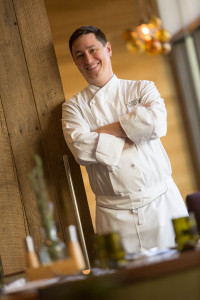 Can you describe one of your most career defining moments?
Can you describe one of your most career defining moments?
When I had the revelation people could design things so we could have an abundance of food on this planet without a problem. Not just to cook, but, having three small children, more of a perspective on how can we teach our kids a lot of important things we’ve lost along the way. I grew up with farms and huge gardens, canning tomatoes and peppers with my family – we even had a small preservation room for pickles! One of the things I’m really involved with studying is permaculture design. Bill Mollison (science teacher, biologist, and author of Permaculture: A Designers’ Manual) took ecology and architecture and built them into these systems – it’s more than just gardening it’s a philosophy. Food is obviously a big part of it, and there are several principles, but the primary ones are taking care of planet, taking care of people and sharing the abundance. As cooks and chefs we can help change the world. It’s amazing to me the human race has been around for thousands of years but we’ve forgotten so many important things – looking to nature, the universe. Another pioneer is Farmer Lee Jones of The Chef’s Garden in Huron, Ohio. His family’s 300-acre vegetable farm grows the best-tasting and most nutritious specialty vegetables, herbs and micro greens around – talk about a farmer who changed the world!
You’ve lived across the country from New Orleans to Seattle. What’s your favorite food city and what’s one of your favorite dishes there?
It’s impossible to pick but the Pacific North West resonates the most – purely because it’s the largest group of likeminded individuals who share the importance of knowing where good comes from. The appreciation for uniqueness is like nowhere else. Farm to table, sustainability, locally sourced, call it what you want – it’s not a trend it’s a way of life up there and has been for decades. Seattle is very supportive of farmer’s markets and they take a lot of pride in their local beers and produce, so for me Seattle is a very special place.
The JW Marriott Desert Springs Resort & Spa is located at 74-855 Country Club Dr, Palm Desert, CA 92260. Call (760) 341-2211, or visit www.marriott.com for more information.

